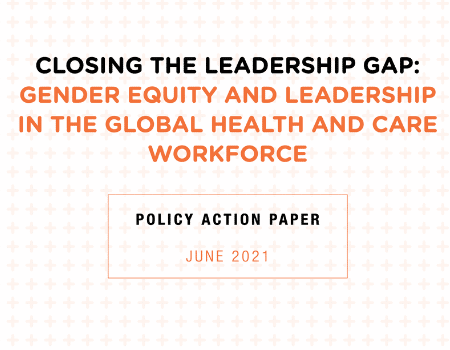Closing the leadership gap: gender equity and leadership in the global health and care workforce
The health and social care sector is one of the largest and fastest growing employment sectors in the world, particularly for women. Women provide essential health and care services for around 5 billion people and contribute an estimated US$ 3 trillion annually to global health; half in the form of unpaid work.
Women comprise almost 70% of health and social care workers globally and nearly 90% of the nursing and midwifery workforce and yet it is estimated that they hold only around 25% of leadership roles in health . This paper examines the paradox of why so few women are leaders in a majority female profession and explores actions that can be taken to redress this gender imbalance which impacts on health security and health and care delivery for all.
In March 2019 WHO launched a landmark report, Delivered by women, led by men: a gender and equity analysis of the global health and social workforce. The report, a product of the WHO Gender Equity Hub (GEH) of the Global Health Workforce Network, calls for urgent action to address gender inequities in the health and social care workforce in order to reach universal health coverage (UHC) and other Sustainable Development Goal (SDG) targets.
The four thematic areas in the report were: gender parity in leadership; occupational segregation; decent work free from bias, discrimination and harassment, including sexual harassment; and the gender pay gap. In March 2020, building on the report, the WHO GEH launched a public consultation on “gender equity and leadership in the global health and social workforce”.
Following a literature review, the GEH is launching this policy action paper, incorporating feedback received from public consultation and focusing on pragmatic policy actions. The leadership gap between women and men in health can only be closed by addressing systemic barriers to women’s advancement.
Since Delivered by women, led by men was published, the world has been hit by the
COVID-19 pandemic, which has stress tested the resilience of health, social and economic systems in all countries and produced additional evidence and lessons on gender, equity and the health and care workforce, the subject of this paper. COVID-19 has had a profound impact on women in the health and care workforce and threatens to widen the leadership gap for women in the sector.

